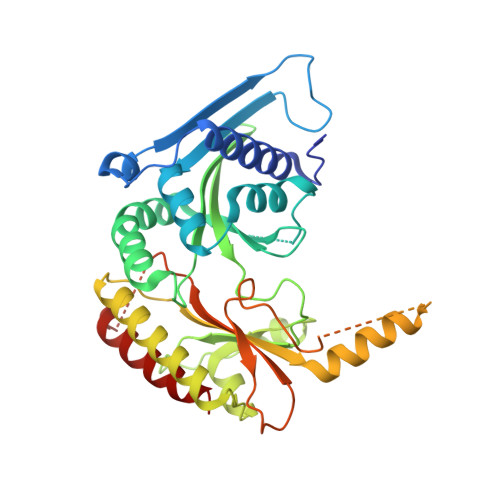The GTP responsiveness of PI5P4K beta evolved from a compromised trade-off between activity and specificity.
Takeuchi, K., Ikeda, Y., Senda, M., Harada, A., Okuwaki, K., Fukuzawa, K., Nakagawa, S., Yu, H.Y., Nagase, L., Imai, M., Sasaki, M., Lo, Y.H., Ito, D., Osaka, N., Fujii, Y., Sasaki, A.T., Senda, T.(2022) Structure 30: 886-899.e4
- PubMed: 35504278
- DOI: https://doi.org/10.1016/j.str.2022.04.004
- Primary Citation of Related Structures:
6K4G, 6K4H, 7EM1, 7EM2, 7EM3, 7EM4, 7EM5, 7EM6, 7EM7, 7EM8 - PubMed Abstract:
Unlike most kinases, phosphatidylinositol 5-phosphate 4-kinase ¦Â (PI5P4K¦Â) utilizes GTP as a physiological phosphate donor and regulates cell growth under stress (i.e., GTP-dependent stress resilience). However, the genesis and evolution of its GTP responsiveness remain unknown. Here, we reveal that PI5P4K¦Â has acquired GTP preference by generating a short dual-nucleotide-recognizing motif called the guanine efficient association (GEA) motif. Comparison of nucleobase recognition with 660 kinases and 128?G proteins has uncovered that most kinases and PI5P4K¦Â use their main-chain atoms for adenine recognition, while the side-chain atoms are required for guanine recognition. Mutational analysis of the GEA motif revealed that the acquisition of GTP reactivity is accompanied by an extended activity toward inosine triphosphate (ITP) and xanthosine triphosphate (XTP). Along with the evolutionary analysis data that point to strong negative selection of the GEA motif, these results suggest that the GTP responsiveness of PI5P4K¦Â has evolved from a compromised trade-off between activity and specificity, underpinning the development of the GTP-dependent stress resilience.
Organizational Affiliation:
Molecular Profiling Research Center for Drug Discovery and Cellular Molecular Biotechnology Research Institute, National Institute of Advanced Science and Technology, Aomi, Koto, Tokyo 135-0063, Japan; Graduate School of Pharmacological Sciences, The University of Tokyo, Hongo, Bunkyo, Tokyo 113-0033, Japan. Electronic address: koh-takeuchi@mol.f.u-tokyo.ac.jp.


















